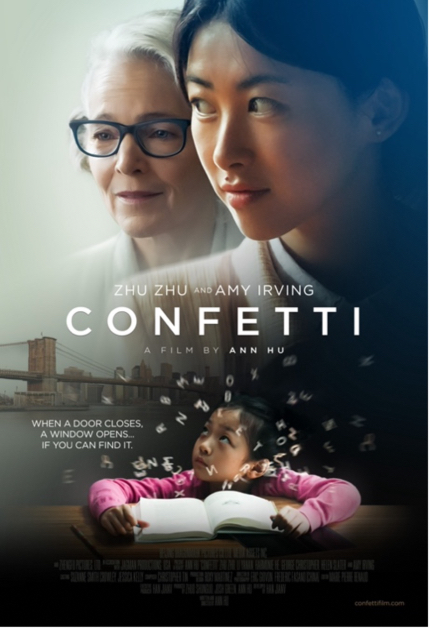Review: CONFETTI, Mother Loves Daughter, Who Yearns to Learn
Written and directed by Ann Hu, and starring Zhu Zhu and Amy Irving, a story about a mother's love for her daughter becomes an equally compelling immigrant drama.

Do you speak, read, write, and understand your own native language? Good for you! What about those who do not? Is three out of four good enough?
Confetti
The film will be available in U.S. theaters on August 20, 2021. Visit the official site for more information.
Cocooned in a happy home with loving parents, Lan (Zhu Zhu) and Chen (Yanan Li), Meimei (Harmonie He) is a happy child at home and in her neighborhood, a small town in China. School is an entirely different experience for her, though, since she is ridiculed and taunted by her classmates and misunderstood by her teachers, due to her difficulties in learning.
What is wrong with her? Her mother, a labourer, must scour the country for help, as her supportive and loving husband stands by, smoking, unable to do anything to affect the situation.
Written and directed by Ann Hu (Shadow Magic, Beauty Remains), based upon her own experiences, Confetti soon reveals that Meimei has dyslexia. It could be a fatal situation.
In 1989 China, dyslexia was infrequently diagnosed and usually misunderstood, and Lan, despite her best efforts to locate a school in China that can help her beloved child, comes face to face with a ticking time bomb. Because of the nature of Meimei's learning disability, she will be locked into a lifetime of challenges and limitations, since it will not be possible for her brain to be rewired unless the nine-year-old child receives specialized education and training now.
Compelled by love and something strongly felt that is not revealed fully initially, Lan decides to move to New York City. Well-meaning Thomas (George Christophe), a teacher, who helped to diagnose her dyslexia in the first place, volunteers his mother Helen (Amy Irving) to provide housing, a job for Lan, and help in locating a suitable educational facility for Meimei.
Clearly, however, he was motivated more by neighborly concern for one of his students than anything else, since Helen is not really in a position to provide help for anyone; she is a professional writer on deadline, which sucks up all her mental energies, and, further, she is physically disabled, confined to a wheelchair.
Marooned in a big city, Lan and Meimei are limited to speaking Chinese, though Meimei can speak a little English. Lan does not even have legal status to work. Nonetheless, she knows that a clock is ticking, and she is determined to do whatever is required in order to secure assistance for her daughter.
Her kindly countenance, polite manners, and steadfast work ethic gradually win over Helen, and so does Meimei's sunny disposition. Helen becomes Meimei's champion, though she quickly discovers that the deck is stacked against the child, especially in the roaring cauldron that is the education system for differently-abled children in New York City.
Ann Hu develops the story in a quietly captivating manner, resembling to some degree an education noir. The ending seems pre-ordained: Lan, Meimei and Helen can't possibly win against these odds. Or can they?
Admittedly, I have strong personal feelings on the subject, not only because I have family members and friends who have dealt with dyslexia, but also because my own personal experience over the past year has taught me that the world in general is stacked against anyone in need of assistance that is not common.
Beautifully shot and constructed, with an easy rhythm to watch and enjoy the rather intimate and perceptive performances, Confetti is frustrating yet rewarding. Yes, these things happen, over and over again. We can only hope for better in the future.







